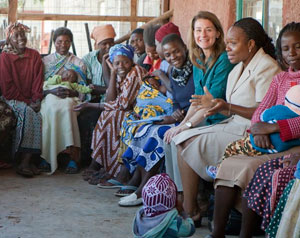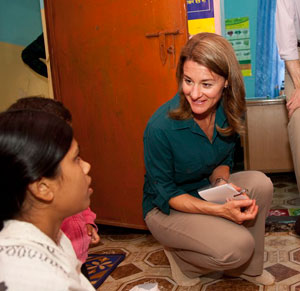FALL 2012 CONTENTS
Home
Bottom line
Medicine's Funding Pool is Drying Up
The competition
On the hunt for research dollars
Against the odds
A band of rebels fights to save health care
Giving well
Philanthropists roll up their sleeves
Melinda Gates on family matters
A conversation about contraception
Testing testing
Why some cancer screenings stir such controversy

DOWNLOAD PRINTABLE
ISSUE (PDF)


Special Report
Melinda Gates on family matters
A conversation about contraception
Photographs courtesy of the Bill & Melinda Gates Foundation
Melinda Gates and a community health worker visit with a newborn baby in Uttar Pradesh, India.
It's hard not to gush about Melinda Gates and her philanthropic verve. The world's fourth-most powerful woman, according to Forbes magazine, has stepped into the exceedingly sharp-edged world of family planning in a substantial way.
In July, the Bill & Melinda Gates Foundation co-hosted the London Summit on Family Planning with the U.K. Department for International Development.
There, participants from developing countries, international agencies, foundations and the private sector made new financial commitments amounting to $2.6 billion, exceeding the summit's goal. The event galvanized political commitments and raised the financial resources to deliver contraceptives to an additional 120 million women in the developing world by 2020, which is estimated to cost $4.3 billion in cash and developing country resources. The Gates Foundation will have invested over $1 billion into voluntary family planning services by 2020.

At a motherís group in Nairobiís Korogocho slum
To be sure, it's a philanthropic endeavor that's not without pushback. A Roman Catholic, her church's doctrine is clear that contraception is a sin. Yet Melinda Gates is resolute and at peace with her decision. She believes that giving women access to contraceptives is critical for them to be able to provide a better future for their children, and that in the long term, this has the potential to improve the health, productivity and economic opportunities of families in some of the world's poorest countries. Paul Costello, executive editor of Stanford Medicine, posed some questions to Gates about this initiative and to find out why family planning looms so large in both her heart and her mind.
Paul Costello: You’ve made a huge financial commitment to family planning and are raising even more. How will this money be used?
Melinda Gates: The commitments will seek to address the policy, financing, demand and delivery barriers to women accessing contraceptive information, services and supplies. By 2020, these efforts will result in 200,000 fewer women dying in pregnancy and childbirth, more than 110 million fewer unintended pregnancies, over 50 million fewer abortions and nearly 3 million fewer babies dying in their first year of life.
Costello: For someone who hasn't often stepped into the glare of the public spotlight, you've certainly chosen an issue filled with controversy. How did you reach this decision?
Gates: I have been given the privilege to travel extensively in developing countries, to learn what life is like for women and girls. Today, more than 200 million women and girls in developing countries who don't want to get pregnant lack access to contraceptives. I wrestled with my feelings when it came to speaking out about this issue but the more I learned, the more I felt compelled to do something about it, and it became a very clear decision for me. I have made the issue of family planning my priority because these women tell me that having the power to decide when to have a child is a key to achieving their goals in life. They want to be able to feed their children, take them to the doctor when they're sick and send them to school so they can fulfill their potential. I don't see any controversy in helping women determine their own future.
Costello: You must have heard unforgettable stories from these women.
Gates: Last year, I met with a mother's group in a slum outside Nairobi. The women were taking turns explaining why they use birth control. Finally, a woman named Marianne summed up the whole conversation in a phrase I'll never forget. She said, "I want to bring every good thing to one child before I have another." That's universal. We all want to bring every good thing to our children. What is not universal is our ability to provide every good thing to our children.
Costello: I've heard you call access to contraception a social justice issue. Why social justice?
Gates: As I travel and talk with women in developing countries, what's universally clear is that when a woman can decide if and when to have children, she's healthier, her children are healthier, her family is more successful and her community benefits. Empowering a couple to lead the life they want and decide whether and when to have a child can create opportunities for transformational improvements in their family's health and prosperity. Our foundation exists to help parents in the world's poorest countries give their children the opportunity for that better future.
Costello: There's a huge hole in R&D on birth control medications and devices. Is this an area where the Gates Foundation might make financial investments?
Gates: Longer-term, more innovative research and development work needs to be done to create new contraceptives that meet more of women's needs. It has been many years since the R&D community developed new contraceptives for women, but I believe there is momentum behind this priority.
For example, Pfizer is testing a convenient, single-dose, injectable contraceptive that makes it easier for health workers to administer in women's homes. Eventually, women might even be able to administer it themselves.
The secret to these innovations is not secret at all ó it is thinking about what a woman needs from the outset. That frame of mind yields an endless supply of potentially powerful solutions that can be tested and continually improved. Bill and I are committed to bringing the best of those solutions to women everywhere.

At a nutrition center in Dhaka, Bangladesh.
Costello: Of all the critical issues from which you could choose, why do you want family planning to be your lifetime's work?
Gates: I know that having access to contraceptives was very important in giving me the power to lead the life I wanted. When I talk to women in poor countries, they tell me contraceptives would do the same for them. Their ability to decide if and when to have a child enables them to create new opportunities in their communities and a better future for their children. But hundreds of millions of women don't have access to these lifesaving, life-changing contraceptives, and I believe I can use my voice to help change that. It will take many years and the commitment of countless partners on the ground in countries around the world, but I believe together we can help to provide all families the opportunity to lead healthy and productive lives. That is why I am making this my life's work.

